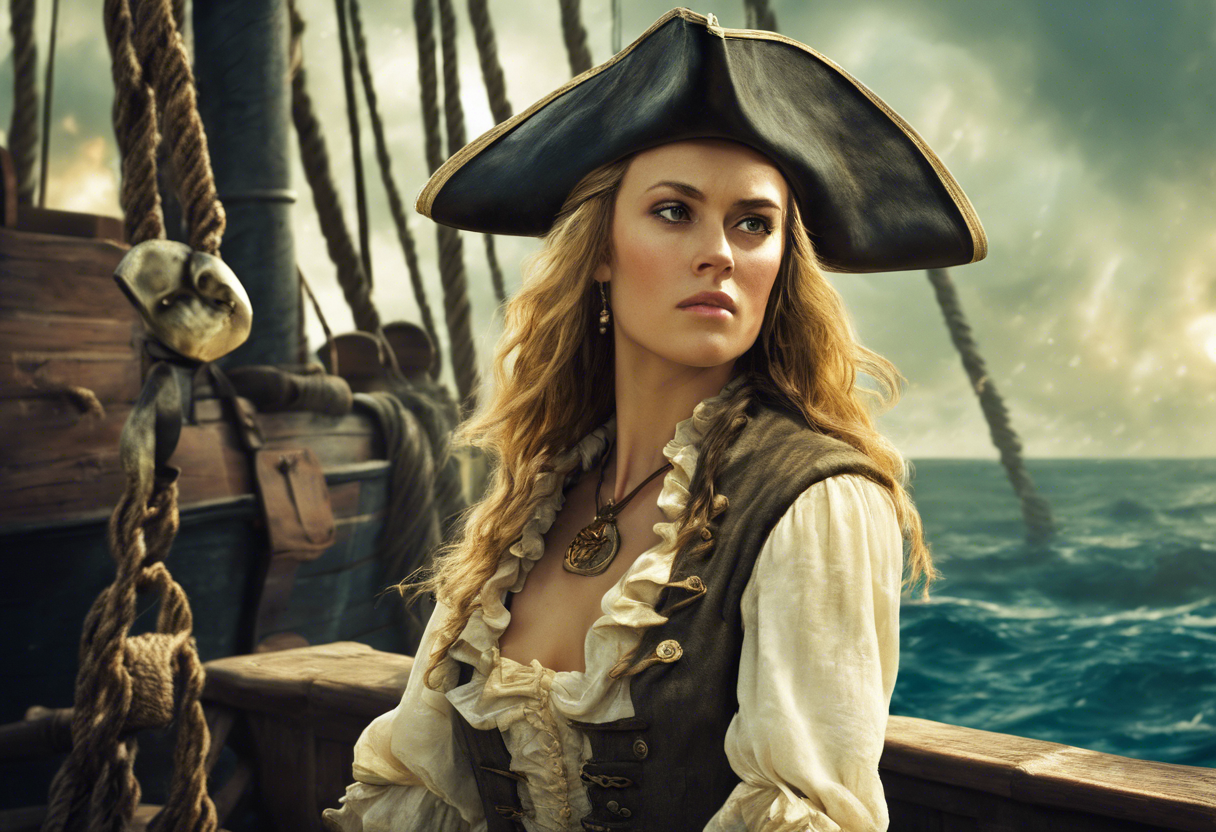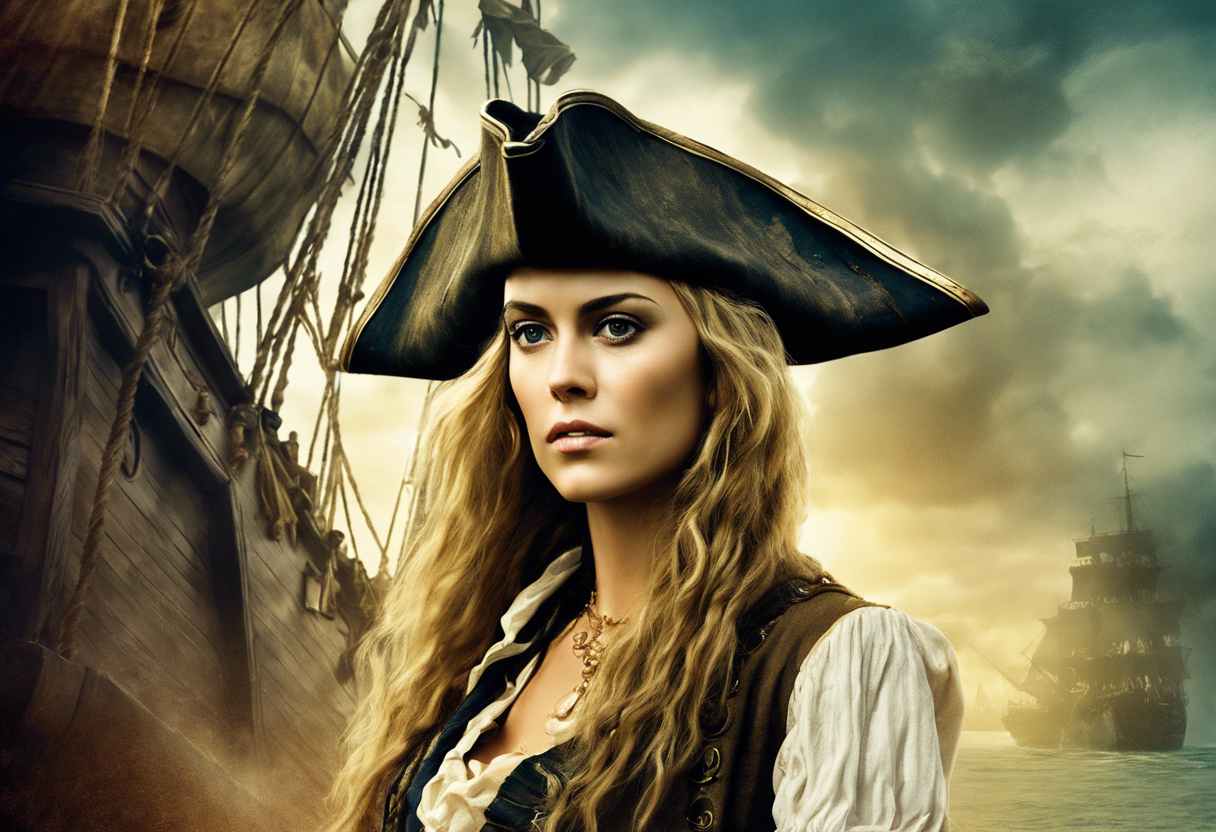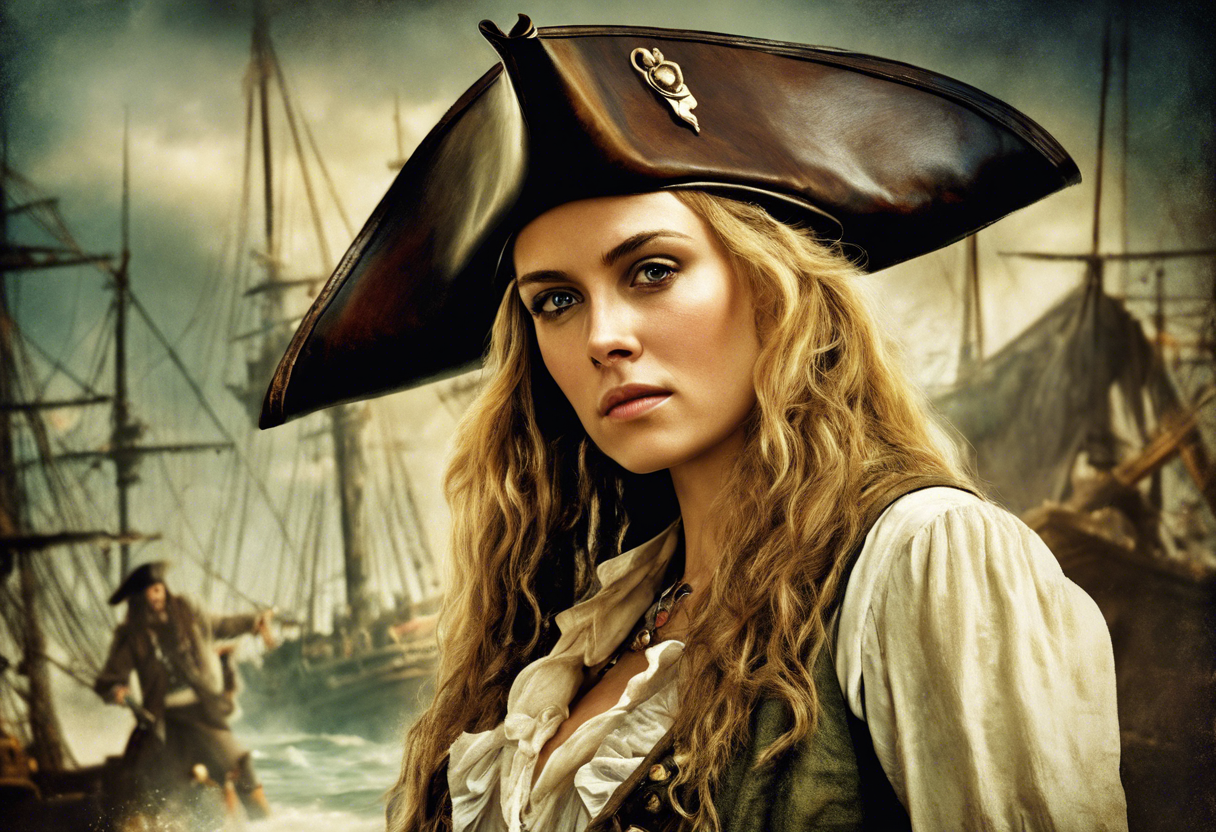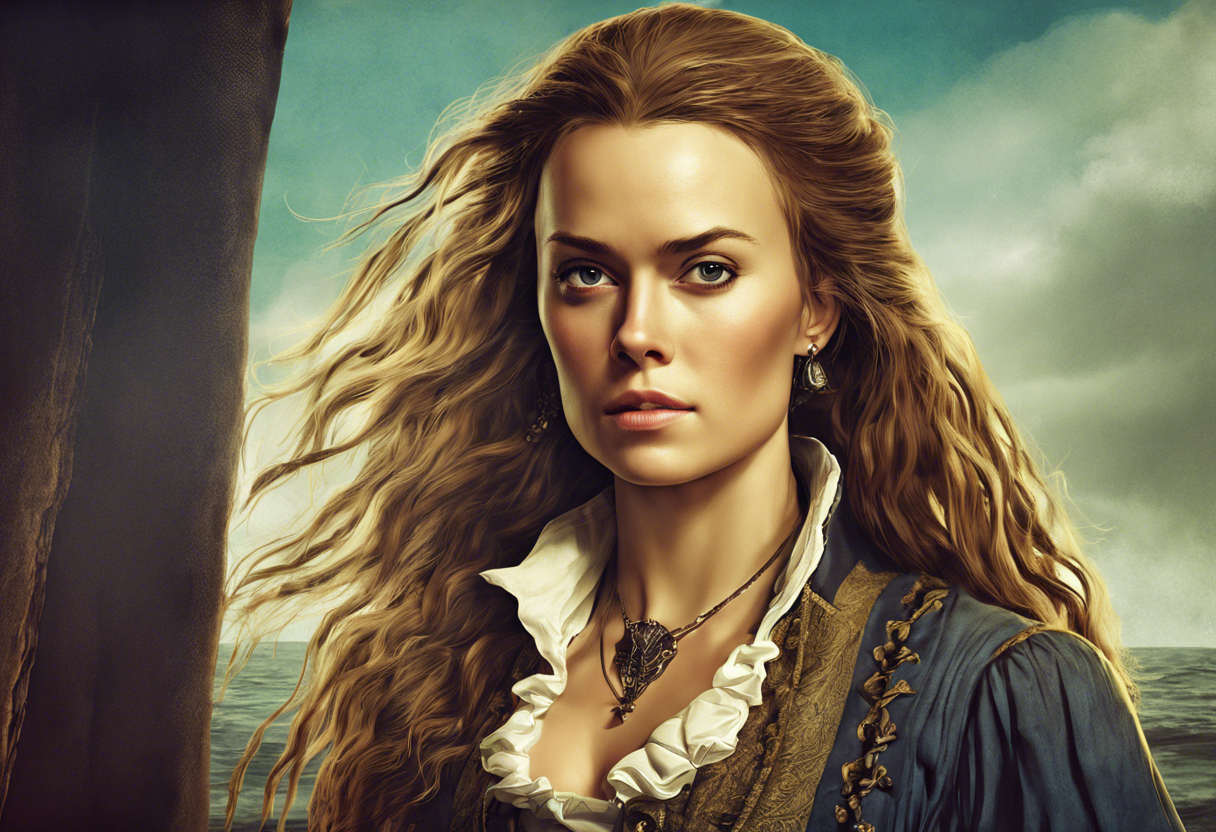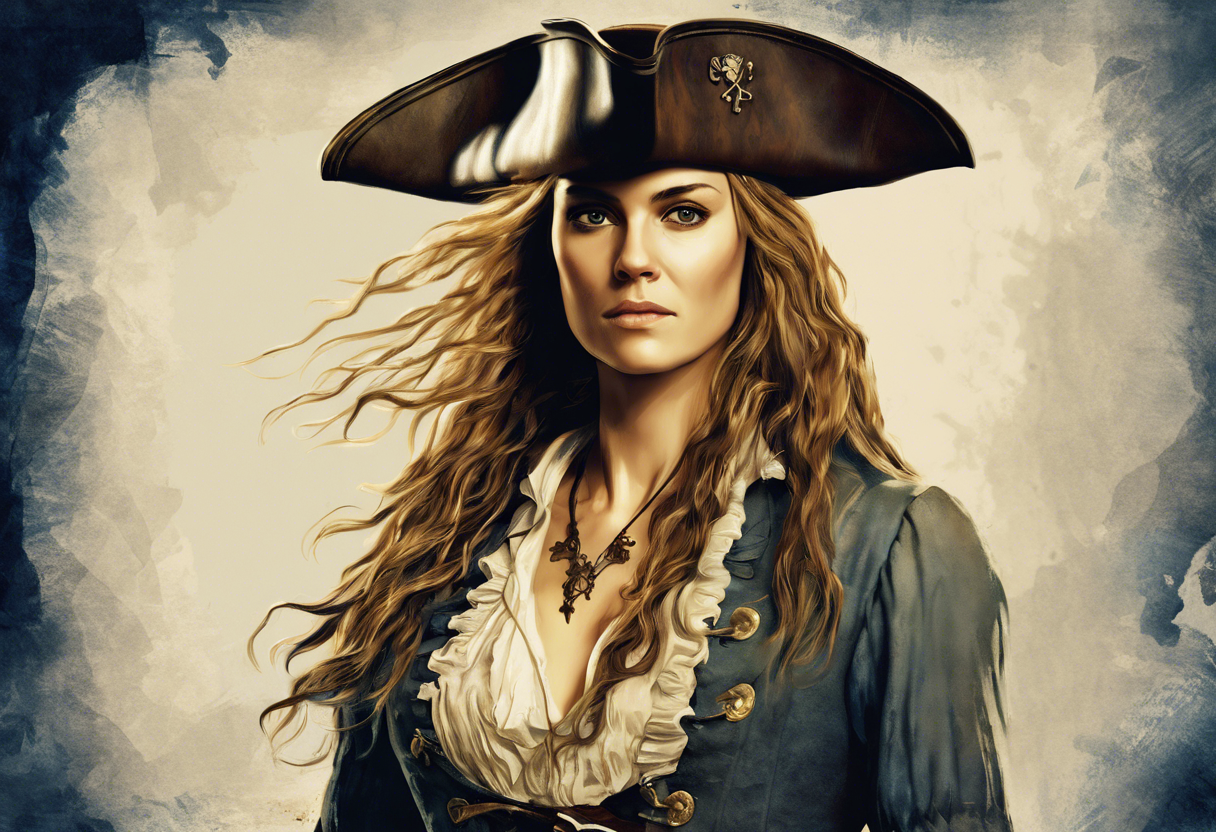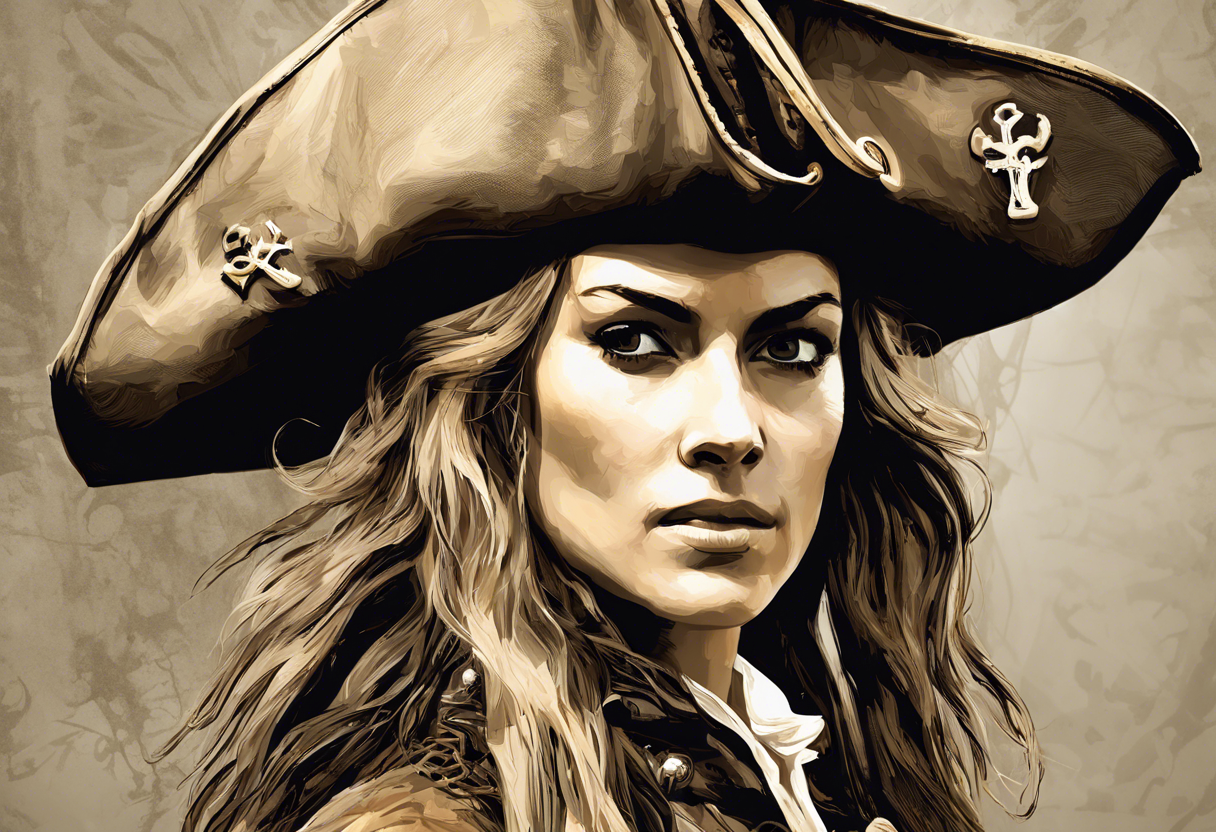Contents
Introduction
Elizabeth Swann, a pivotal character in the Pirates of the Caribbean franchise, is a testament to the evolution of female protagonists in modern cinema. Created by screenwriters Ted Elliott and Terry Rossio, Elizabeth is the daughter of Governor Swann, a high-ranking official in the colonial town of Port Royal. From her early introduction, Elizabeth is portrayed as a young woman who defies the societal norms of her time, exhibiting a strong sense of independence, intelligence, and a deep fascination with the world of piracy.
Elizabeth’s backstory is marked by her restrictive life as a governor’s daughter, where she is expected to adhere to the strictures of high society. However, her discovery of a pirate medallion on a young Will Turner sets her on a path that diverges significantly from the expected role of a lady in the 18th century. This early encounter sparks a curiosity and allure to the pirate world that becomes a defining trait throughout her journey.
Within the narrative, Elizabeth plays a central role, often finding herself at the heart of key events and conflicts. Her transformation from a governor’s daughter to a pirate and eventually the Pirate King is a compelling arc that underscores her growth, courage, and leadership abilities. This character development is significant not only within the context of the films but also in the broader landscape of Disney heroines, as Elizabeth Swann subverts traditional tropes and embodies a more radical and empowered female character.
Role in the Story
Elizabeth Swann’s storyline is intricately woven into the fabric of the Pirates of the Caribbean trilogy. In the first film, The Curse of the Black Pearl, Elizabeth is introduced as a young woman trapped in the societal expectations of her father’s position. Her life takes a dramatic turn when she is kidnapped by Captain Barbossa and his crew of ghost pirates. This event sets off a chain of adventures where Elizabeth must navigate the dangerous world of piracy, form alliances, and make crucial decisions to ensure her survival and the resolution of the curse afflicting the pirates.
In Dead Man’s Chest, Elizabeth’s role expands as she becomes more deeply embroiled in the pirate world. She and Will Turner are sentenced to death, leading to a series of events where Elizabeth disguises herself as a man to find Will and Jack Sparrow. This film highlights her resourcefulness, bravery, and the exploration of her desires and affections, particularly her complex feelings towards both Will and Jack Sparrow[2][3].
The third film, At World’s End, sees Elizabeth at the pinnacle of her transformation. She is named captain by Sao Feng and later becomes the Pirate King, rallying the pirate lords against the East India Trading Company and Davy Jones. Her leadership and strategic thinking are crucial in the final battle, showcasing her growth into a powerful and respected figure among the pirates[1][4].
Throughout her journey, Elizabeth’s relationships with other characters are pivotal. Her love for Will Turner is a constant theme, but her interactions with Jack Sparrow and other pirate characters also shape her development. Her ability to negotiate, improvise, and fight back when necessary makes her a formidable character who earns the respect of her peers[3][4].
Character Analysis
Elizabeth Swann’s personality is a blend of traditional feminine virtues and unconventional traits that set her apart from typical Disney heroines. She is intelligent, brave, and resourceful, often using her femininity to her advantage in a male-dominated world. From a young age, Elizabeth displays a rebellious streak, rejecting the societal norms that constrain her. Her fascination with piracy is not just a childish obsession but a deep-seated desire for adventure and freedom[2][5].
One of Elizabeth’s greatest strengths is her ability to adapt and think on her feet. She quickly processes information and makes strategic decisions, often outsmarting her adversaries. Her leadership qualities are evident in her ability to rally the pirates and inspire them to fight for their freedom[1][3].
Despite her many strengths, Elizabeth also has flaws and vulnerabilities. Her journey is marked by moments of doubt and uncertainty, particularly in her relationships with Will and Jack. However, these complexities make her a more relatable and human character. Her development from a damsel in distress to a strong, independent leader is a compelling arc that resonates with audiences[2][4].
Themes and Symbolism
Elizabeth Swann embodies several key themes in the Pirates of the Caribbean franchise. One of the most significant is the theme of freedom and the desire to break free from societal constraints. The sea, which surrounds Port Royal, symbolizes the potential life beyond the confines of her current existence. Elizabeth’s journey is a metaphor for the quest for freedom and the exploration of one’s true self[1][5].
Another theme is the empowerment of women. Elizabeth’s character challenges traditional gender roles and stereotypes, showing that women can be strong leaders, strategists, and adventurers. Her transformation into the Pirate King is a powerful symbol of female empowerment and leadership[2][3].
The character also explores the theme of identity and self-discovery. Elizabeth’s experiences shape her into a woman who is confident in her abilities and unafraid to stand up for what she believes in. Her journey is a reflection of the struggles and triumphs that many women face in navigating a male-dominated world[3][4].
Cultural Impact
Elizabeth Swann has had a significant cultural impact since her introduction in the Pirates of the Caribbean franchise. She has been praised for her complexity and depth, making her one of the most radical and empowering female characters in Disney history. Her influence extends beyond the films, inspiring young women and serving as a role model for those seeking to break free from societal expectations[2][3].
In popular culture, Elizabeth Swann has been referenced and admired in various forms of media. Her character has been the subject of numerous analyses and discussions, particularly in the context of feminist literature and film studies. Her portrayal by Keira Knightley has also been widely praised, adding to the character’s enduring appeal[3][4].
Critical Reception
Elizabeth Swann has received widespread critical acclaim for her portrayal in the Pirates of the Caribbean trilogy. Critics have praised her character arc, noting her transformation from a governor’s daughter to a powerful pirate leader. Her complexity and depth have been highlighted as standout features, distinguishing her from other Disney heroines[2][4].
Audiences have also responded positively to Elizabeth’s character, appreciating her strength, intelligence, and independence. Her relationships with other characters, particularly Will and Jack, have been a subject of interest and discussion among fans. While some critics have noted moments where she falls into traditional tropes, her overall impact as a strong and empowered female character has been widely acknowledged[1][3].
Legacy
Elizabeth Swann’s legacy is that of a trailblazing female character who has inspired countless fans and influenced the portrayal of women in cinema. Her character arc is a testament to the power of storytelling in shaping perceptions and challenging societal norms. As a role model, Elizabeth Swann embodies the qualities of courage, intelligence, and leadership, making her a compelling and relatable character.
In contemporary discussions, Elizabeth Swann remains a relevant figure, symbolizing female empowerment and the quest for freedom and self-discovery. Her influence can be seen in other works of fiction where strong, independent female characters are central to the narrative. As a cultural icon, Elizabeth Swann continues to inspire and captivate audiences, ensuring her enduring appeal in the world of cinema and beyond.
References
- https://marvelousgeeksmedia.com/2021/06/25/character-deep-dive-elizabeth-swann/
- https://nerdist.com/article/elizabeth-swann-pirates-of-the-caribbean-disneys-radical-heroine/
- https://www.hercampus.com/school/kenyon/feminism-corset-evolution-elizabeth-swann/
- https://vocal.media/viva/when-i-write-female-characters-i-look-to-elizabeth-swann
- https://www.charactour.com/hub/characters/view/Elizabeth-Swann.Pirates-of-the-Caribbean-the-Curse-of-the-Black-Pearl

